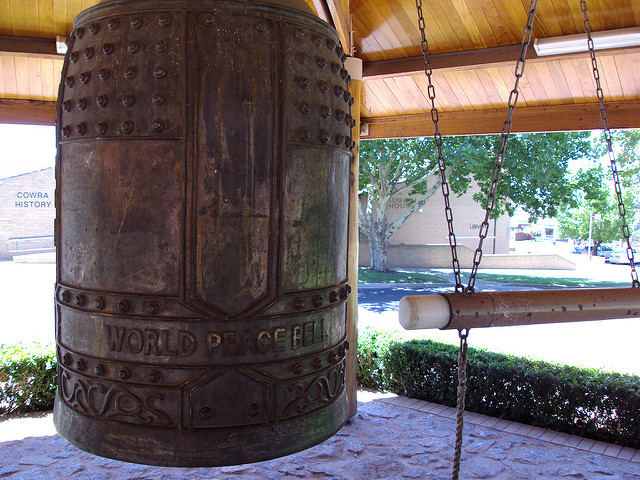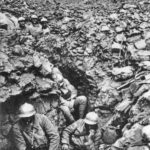
Cowra Peace Bell tolls a warning
As many know, Cowra once held a Japanese prisoner of war camp. The tragedies that happened there when the prisoners tried to break out, has become the stuff of Australian legend. Less well known is that Japanese civilians were also interned in Cowra during the war. Some never left Cowra. A World Peace bell, donated by the World Peace Bell Association, was erected in Cowra in 1992, in recognition of the city’s contribution to peace and its enduring connections with Japan.
I wrote this poem after a visit to Cowra. The Cowra Peace Bell, like those erected in other cities around the world, follows a traditional Japanese design. In Japan the bell is known as bonshō or ogane. Although the World Peace Bells are symbols of hope and the journey from conflict to peace, the deep resonance of the tolling of the bonshō carries across long distances, and among its traditional uses was as an alarm.
The peace bell tolls a warning
La campana della pace suona l’allarme
In Cowra, the Peace Bell tolls a warning,
And magpies caw their raucous and wry chorus in reply.
A Cowra, la Campana della pace suona l’allarme,
E le gazze gracchiano il loro rauco e ironico coro in risposta.
Their voices reach a quiet graveyard,
An unusual place,
Here Japanese mothers and children sleep.
So far from home – they are not forgotten.
Le loro voci arrivano a un cimitero quieto,
Un luogo insolito,
Qui madri giapponesi dormono accanto ai loro figli.
Così lontani da casa – ma non sono dimenticati.
ANZACS sleep nearby -almost – almost – beside them.
They too attract the living – not forgotten.
How strange, the earth’s embrace draws them so close.
Vicino dormono soldati australiani – quasi quasi – proprio accanto a loro.
I viventi vengono pure per loro – non sono dimenticati.
Che strano, la terra li abbraccia e li tiene così vicini.
The Peace Bell tolls a warning.
Keep them out the shrill galah shrieks
And fearful faces turn to listen, hatred rising in their eyes.
La campana della pace suona l’allarme.
Tienili fuori, il galah stridente strilla
E facce impaurite si voltano per udire, l’odio crescente nei loro occhi.
Across the plain a musty folk museum lies,
Its most sacred relic, a roll-up flag.
Turn them out the galah once screamed,
Chinese are not wanted here.
Attraverso la pianure c’è un museo folcloristico ammuffito,
La sua reliquia più sacra, la bandiera di convocazione.
Mandateli via, strillava il galah una volta,
I cinesi qui non sono voluti.
The wind whispers across empty hills,
Unheard between the grass-blades,
Once other feet walked this land.
Il vento sussurra sulle vuote colline,
Nessuno lo sente fra i fili dell’erba,
Una volta altri piedi camminavano su questa terra.
In another place professors are marched from their towers.
And razor wire curls lazily towards the horizon,
Human victims caught in its merciless coils.
Behind it shelter fearful nations.
In un altro paese i professori sono cacciati dalle loro torri
E il filo spinato si sfila languidamente verso l’orizzonte,
Vittime umane intrecciate nei suoi rotoli spietati.
Dietro cui prendono rifugio nazioni impaurite.
The Peace Bell tolls a warning.
In the Hall of Memory stands a forgotten airman,
At his feet – ruins – his handiwork – his ruins.
Above him a wyvern grins.
La campana della pace suona l’allarme.
Nella sala della memoria si trova l’aviatore dimenticato,
Ai suoi piedi — rovine — opera della sua mano — le sue rovine.
In alto un gargoyle sorride.
It watches and waits and has not forgotten.
The Peace Bell thunders a warning.
by Michael Curtotti
Guarda e aspetta, e non ha dimenticato.
La campana della pace tuona l’allarme.
Translated by Michael Curtotti
This article was updated on 27 January 2025. An introduction was added, together with an Italian translation of the poem.
With grateful thanks to Azzurra Cirrincione for her proofreading of the Italian translation.






